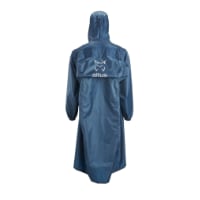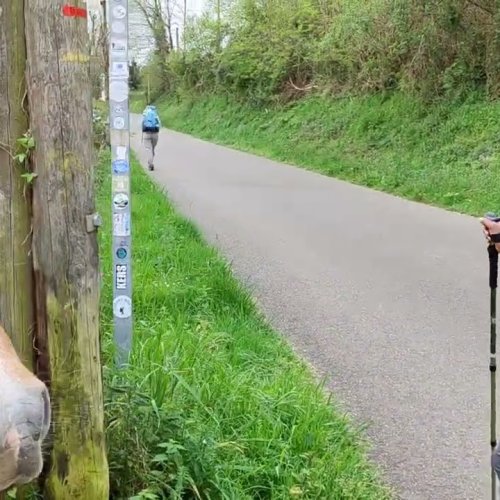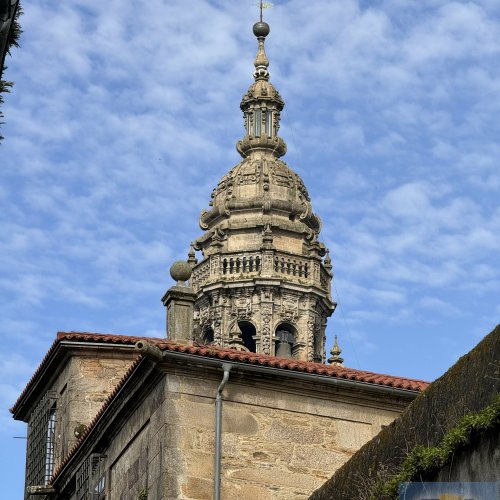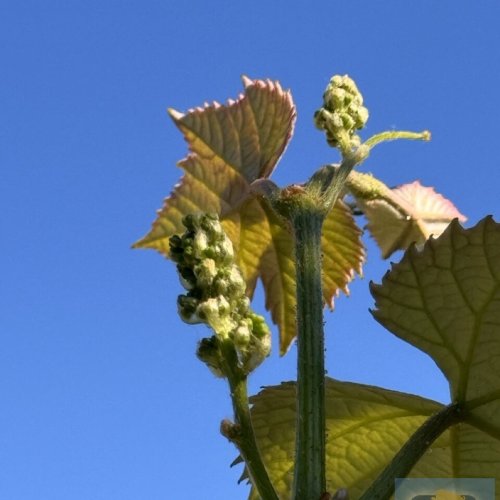D
-
Get your Camino Frances Guidebook here.
-
For 2024 Pilgrims: €50,- donation = 1 year with no ads on the forum + 90% off any 2024 Guide. More here.
(Discount code sent to you by Private Message after your donation) -
 ⚠️ Emergency contact in Spain - Dial 112 and AlertCops app. More on this here.
⚠️ Emergency contact in Spain - Dial 112 and AlertCops app. More on this here.
Search 69,459 Camino Questions
You are using an out of date browser. It may not display this or other websites correctly.
You should upgrade or use an alternative browser.
You should upgrade or use an alternative browser.
Join our full-service guided tour and let us convert you into a Pampered Pilgrim!
sillydoll
Veteran Member
- Time of past OR future Camino
- 2002 CF: 2004 from Paris: 2006 VF: 2007 CF: 2009 Aragones, Ingles, Finisterre: 2011 X 2 on CF: 2013 'Caracoles': 2014 CF and Ingles 'Caracoles":2015 Logrono-Burgos (Hospitalero San Anton): 2016 La Douay to Aosta/San Gimignano to Rome:
I saw this article - the dozens of comments were more entertaining!
fraluchi
RIP 2019
- Time of past OR future Camino
- One every year since 2007
Indeed. What the writer mixed up is the term "pilgrimage".sillydoll said:I saw this article - the dozens of comments were more entertaining!
According to Wikipedia, "A pilgrimage is a journey or search of moral or spiritual significance. Typically, it is a journey to a shrine or other location of importance to a person's beliefs and faith, although sometimes it can be a metaphorical journey in to someone's own beliefs."
The self-inflicted label "atheist" should be explained in the last minutes of the person's life (when supposedly still able to do so). That our "God", "Creator", "Great Architect" have mercy :cry:
Very light, comfortable and compressible poncho. Specially designed for protection against water for any activity.
Our Atmospheric H30 poncho offers lightness and waterproofness. Easily compressible and made with our Waterproof fabric, its heat-sealed interior seams guarantee its waterproofness. Includes carrying bag.
€60,-
Our Atmospheric H30 poncho offers lightness and waterproofness. Easily compressible and made with our Waterproof fabric, its heat-sealed interior seams guarantee its waterproofness. Includes carrying bag.
€60,-
Yes! I loved the comment which said that someone writing for the Guardian could turn anything into a moral dillema 
Some of the article is just wrong:
"This is where my ethical problem arises. While the Camino is frequented by people of all faiths and none, it is generally accepted that the credencial should be signed by a representative of the Catholic church – usually your local priest, who can send the pilgrim on her way, vouching for her character. But being not only an atheist, and one who is not even baptised, I don't feel comfortable asking for a Catholic priest (in London, no less – which one would I even choose?) to sign my credencial."
This is just a myth. Medieval pilgrims carried letters often from priests attesting to their bona fides as pilgrims and seeking their safe conduct. These letters are the distant relatives of the modern credenciales or pilgrim passports. Very rarely nowadays people write to the Pilgrims' Office asking if such a letter is necessary or if their credencial needs to be signed or stamped by a priest at the outset. The answer is that this is absolutely NOT required.
Next ethical question:
"This dilemma brought more questions to mind. If a fellow pilgrim starts a conversation, at which point should I divulge my lack of faith? And when I do, won't it offend believers to share a holy trail with someone who doesn't share their devotion?"
Answer: many will agree with you and EVERYONE will wish you "buen camino"
Finally there is the hoary old question of what is a pilgrimage and what makes a pilgrim. The Confraternity of St James says about the credencial:
"It presupposes that the bearer is making the pilgrimage for spiritual reasons. This does not necessarily mean Roman Catholic and pilgrims will not be asked about their denomination, or even whether they are Christian, although of course historically the pilgrimage itself has meant Christian pilgrimage. Today and in practice, however, the credencial covers anyone making the pilgrimage in a frame of mind that is open and searching." http://www.csj.org.uk/passport.htm
The Cathedral of Santiago gives the following guidance:
"What is a pilgrim and why do people make the pilgrimage to Santiago?
Pilgrimage is time set apart from normal daily life in which people travel to a holy place. Santiago stands alongside Rome and Jerusalem as the third greatest Christian pilgrimage destination in the world.
Pilgrims on the way to Santiago have the opportunity for personal reflection and prayer as well as enjoying the fellowship of other pilgrims from many different countries. The pilgrimage is an opportunity for spiritual renewal and growth in personal faith."
So...there are few rules and specific definitions. The only real requirement is that we make the journey!
Some of the article is just wrong:
"This is where my ethical problem arises. While the Camino is frequented by people of all faiths and none, it is generally accepted that the credencial should be signed by a representative of the Catholic church – usually your local priest, who can send the pilgrim on her way, vouching for her character. But being not only an atheist, and one who is not even baptised, I don't feel comfortable asking for a Catholic priest (in London, no less – which one would I even choose?) to sign my credencial."
This is just a myth. Medieval pilgrims carried letters often from priests attesting to their bona fides as pilgrims and seeking their safe conduct. These letters are the distant relatives of the modern credenciales or pilgrim passports. Very rarely nowadays people write to the Pilgrims' Office asking if such a letter is necessary or if their credencial needs to be signed or stamped by a priest at the outset. The answer is that this is absolutely NOT required.
Next ethical question:
"This dilemma brought more questions to mind. If a fellow pilgrim starts a conversation, at which point should I divulge my lack of faith? And when I do, won't it offend believers to share a holy trail with someone who doesn't share their devotion?"
Answer: many will agree with you and EVERYONE will wish you "buen camino"
Finally there is the hoary old question of what is a pilgrimage and what makes a pilgrim. The Confraternity of St James says about the credencial:
"It presupposes that the bearer is making the pilgrimage for spiritual reasons. This does not necessarily mean Roman Catholic and pilgrims will not be asked about their denomination, or even whether they are Christian, although of course historically the pilgrimage itself has meant Christian pilgrimage. Today and in practice, however, the credencial covers anyone making the pilgrimage in a frame of mind that is open and searching." http://www.csj.org.uk/passport.htm
The Cathedral of Santiago gives the following guidance:
"What is a pilgrim and why do people make the pilgrimage to Santiago?
Pilgrimage is time set apart from normal daily life in which people travel to a holy place. Santiago stands alongside Rome and Jerusalem as the third greatest Christian pilgrimage destination in the world.
Pilgrims on the way to Santiago have the opportunity for personal reflection and prayer as well as enjoying the fellowship of other pilgrims from many different countries. The pilgrimage is an opportunity for spiritual renewal and growth in personal faith."
So...there are few rules and specific definitions. The only real requirement is that we make the journey!
The first edition came out in 2003 and has become the go-to-guide for many pilgrims over the years. It is shipping with a Pilgrim Passport (Credential) from the cathedral in Santiago de Compostela.
JohnnieWalker said:Yes! I loved the comment which said that someone writing for the Guardian could turn anything into a moral dillema
Some of the article is just wrong:
"This is where my ethical problem arises. While the Camino is frequented by people of all faiths and none, it is generally accepted that the credencial should be signed by a representative of the Catholic church – usually your local priest, who can send the pilgrim on her way, vouching for her character. But being not only an atheist, and one who is not even baptised, I don't feel comfortable asking for a Catholic priest (in London, no less – which one would I even choose?) to sign my credencial."
This is just a myth. Medieval pilgrims carried letters often from priests attesting to their bona fides as pilgrims and seeking their safe conduct. These letters are the distant relatives of the modern credenciales or pilgrim passports. Very rarely nowadays people write to the Pilgrims' Office asking if such a letter is necessary or if their credencial needs to be signed or stamped by a priest at the outset. The answer is that this is absolutely NOT required.
Next ethical question:
"This dilemma brought more questions to mind. If a fellow pilgrim starts a conversation, at which point should I divulge my lack of faith? And when I do, won't it offend believers to share a holy trail with someone who doesn't share their devotion?"
Answer: many will agree with you and EVERYONE will wish you "buen camino"
Finally there is the hoary old question of what is a pilgrimage and what makes a pilgrim. The Confraternity of St James says about the credencial:
"It presupposes that the bearer is making the pilgrimage for spiritual reasons. This does not necessarily mean Roman Catholic and pilgrims will not be asked about their denomination, or even whether they are Christian, although of course historically the pilgrimage itself has meant Christian pilgrimage. Today and in practice, however, the credencial covers anyone making the pilgrimage in a frame of mind that is open and searching." http://www.csj.org.uk/passport.htm
The Cathedral of Santiago gives the following guidance:
"What is a pilgrim and why do people make the pilgrimage to Santiago?
Pilgrimage is time set apart from normal daily life in which people travel to a holy place. Santiago stands alongside Rome and Jerusalem as the third greatest Christian pilgrimage destination in the world.
Pilgrims on the way to Santiago have the opportunity for personal reflection and prayer as well as enjoying the fellowship of other pilgrims from many different countries. The pilgrimage is an opportunity for spiritual renewal and growth in personal faith."
So...there are few rules and specific definitions. The only real requirement is that we make the journey!
As always Johnny Walker's response is spot on. He should submit this to 'The Guardian' soonest.
soch
D
Deleted member 3000
Guest
From the Pilgrim Office website:
The writer did not even have to leave her computer to get accurate information.Finally, one of the pages contains the following directions for use:
This Credencial is only intended for use by those pilgrims who will walk, go on horseback or cycle and who desire to make the pilgrimage with a Christian motivation or at least in the spirit of searching. It is intended to identify the pilgrim. Therefore the issuing organisation must be a parish, a confraternity, Association of the Amigos of the Camino to Santiago and the like. The Credencial bestows no rights on the pilgrim. It has two practical purposes: admission to those albergues which offer Christian hospitality along the way; and to obtain the Compostela from the Cathedral in Santiago which certifies the pilgrimage has been completed.
The Compostela is only issued to those who have made the pilgrimage with a Christian motivation: devotonis affectul vel voti pietatis causa – motivated by devotion, a vow or piety.
The Compostela is also only issued to those who arrive at the Tomb of the Apostle having travelled on foot or on horseback the last 100kms, or 200kms by bicycle.
The Pilgrim Credencial can only be issued by the Church through its own structures: Dioceses, parishes, confraternities or other bodies authorised by the Church. This is the only way the Credencial can be obtained from the S.A.M.I. Cathedral of Santiago (Jornadas sobre el Año Santo: noviembre 1993).
Albergues provide simple accommodation. They do not receive grants for their upkeep and need to be sustained, cleaned and maintained. This is achieved through the contributions of pilgrims.
Organised groups with a support vehicle or on bicycles are asked to find alternative accommodation from the pilgrim albergues.
The bearer of the Credencial accepts these conditions.
Get a spanish phone number with Airalo. eSim, so no physical SIM card. Easy to use app to add more funds if needed.
sillydoll
Veteran Member
- Time of past OR future Camino
- 2002 CF: 2004 from Paris: 2006 VF: 2007 CF: 2009 Aragones, Ingles, Finisterre: 2011 X 2 on CF: 2013 'Caracoles': 2014 CF and Ingles 'Caracoles":2015 Logrono-Burgos (Hospitalero San Anton): 2016 La Douay to Aosta/San Gimignano to Rome:
The late Canon Genaro Cebrián wrote that the Compostela is no longer a document awarded as atonement for sins. However, to be granted the Compostela "it is necessary to confess a religious faith. Pilgrims are not asked about their faith, whether they are Catholics, Buddhists or Islamists. We only ask that the reason is religious", he added.
Therefore, atheists and agnostics can only aspire to an alternative “welcome” document. He refused to give the Queen a Comppstela for failing to meet the requirements.
Queen Sofia visited a few years ago years ago after travelling a few kilometres accompanied by members of the Royal Guard. At the end of their journey they requested the 'Compostela' for her Majesty. But Cebrián refused because they had not fulfilled the requirements, so they were offered a souvenir certificate instead."
Therefore, atheists and agnostics can only aspire to an alternative “welcome” document. He refused to give the Queen a Comppstela for failing to meet the requirements.
Queen Sofia visited a few years ago years ago after travelling a few kilometres accompanied by members of the Royal Guard. At the end of their journey they requested the 'Compostela' for her Majesty. But Cebrián refused because they had not fulfilled the requirements, so they were offered a souvenir certificate instead."
- Time of past OR future Camino
- Past: a few
Last: Sanabres
Next: St Olav's Way
Oh dear. Strictly, agnostics deny that the existence of a supreme being can be known. What they choose to believe is a quite different matter. If they do choose to believe, and they meet the other requirements, they have just as much 'right' to a compestela as anyone.sillydoll said:Therefore, atheists and agnostics can only aspire to an alternative “welcome” document.
Regards,
Get a spanish phone number with Airalo. eSim, so no physical SIM card. Easy to use app to add more funds if needed.
Most read last week in this forum
Just an FYI that all available beds are taken in SJPDP tonight - fully, truly COMPLETO! There’s an indication of how busy this year may be since it’s just a Wednesday in late April, not usually...
Between Villafranca Montes de Oca and San Juan de Ortega there was a great resting place with benches, totem poles andvarious wooden art. A place of good vibes.
It is now completely demolished...
Hi there - we are two 'older' women from Australia who will be walking the Camino in September and October 2025 - we are tempted by the companies that pre book accomodation and bag transfers but...
We have been travelling from Australia via Dubai and have been caught in the kaos in Dubai airport for over 3 days. Sleeping on the floor of the airport and finally Emerites put us up in...
Hi all,
Very new to this so please excuse any ignorance or silly questions :) I'm walking my very first Camino in 2 weeks (iieeeek) - the countdown is on and excitement through the roof.
I've...
From a friend on the ground in Pamplona
https://www.noticiasdenavarra.com/fotos/general/sociedad/2024/04/23/nieve-primaveral-presente-navarra-8152386.html
Similar threads
❓How to ask a question
How to post a new question on the Camino Forum.
Latest posts
-
-
Guardia Civil returning lost passports to owners
- Latest: Anniesantiago
-
-
LIVE from the Camino SJPdP “Completo” tonight!
- Latest: David Tallan
-
Similar threads
-
Why do you want to walk the Camino?
- Started by LaurnaBerry
- Replies: 29
-
-
-
Walking the Camino Francés in May, 2024
- Started by Tracy Flanagan
- Replies: 15
-
LIVE from the Camino Walking the CF for Teresa
- Started by MARSKA
- Replies: 27
Most downloaded Resources
-
“All” Albergues on the Camino Frances in one pdf“All” Albergues on the Camino Frances in one pdf
- ivar
- Updated:
-
A selection of favorite albergues on the Camino FrancésFavorite Albergues along the Camino Frances
- Ton van Tilburg
- Updated:
-
Profile maps of all 34 stages of the Camino FrancesProfile maps of all 34 stages of the Camino Frances
- ivar
- Updated:











